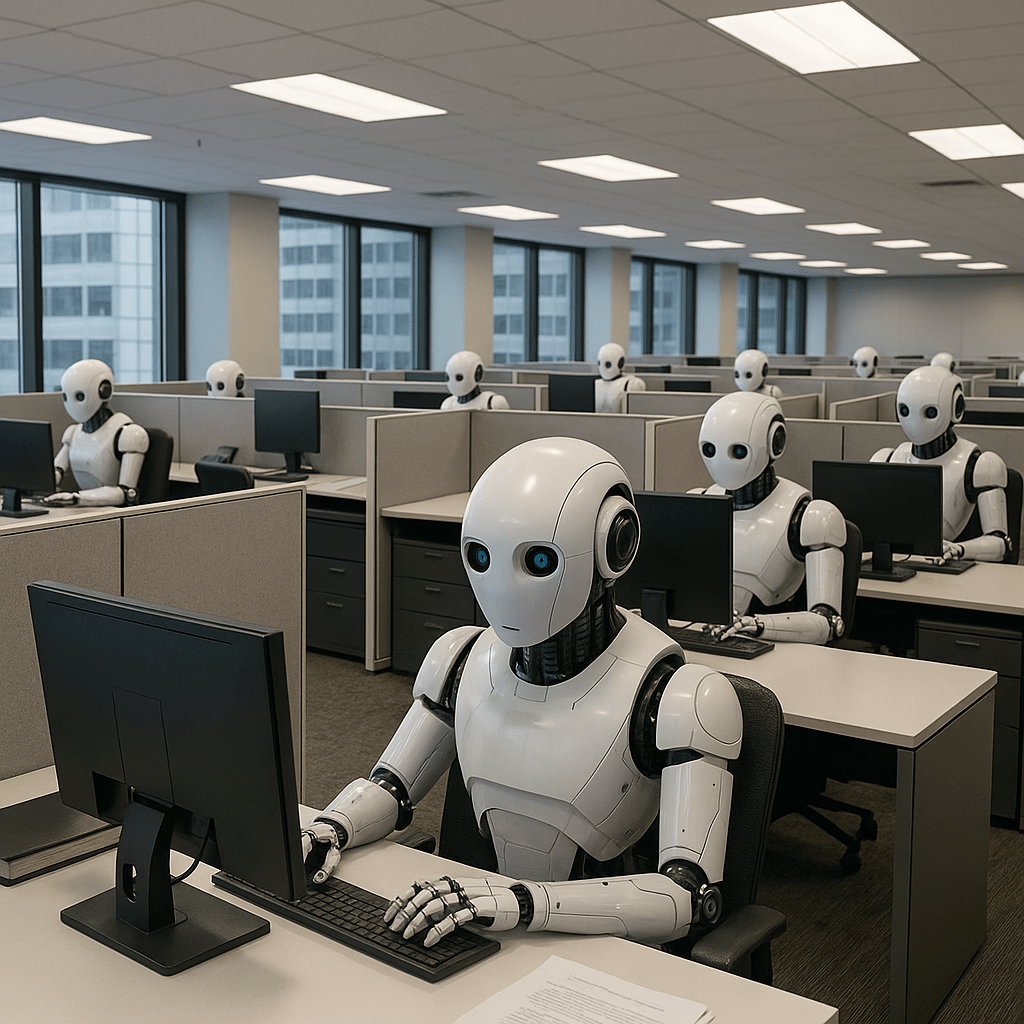When we talk about AI replacing jobs in the UK, it’s easy to imagine a bleak, sci-fi style future: robots doing everything while humans watch from the sidelines. But let’s take a step back.
What’s actually happening today? Which sectors are feeling the changes? What does the future really look like? And perhaps most importantly, what can people do to stay ahead?
Let’s explore the real picture of AI in the UK job market, without the panic, but with plenty of realism.
What’s Happening Right Now: AI’s Impact in the UK So Far
Across the UK, AI is already changing how businesses work. But it’s not about entire jobs vanishing overnight, it’s more about tasks within jobs being automated.
Industries feeling it first
- Customer service: Many companies now use AI-powered chatbots to answer basic questions. This cuts down on repetitive work for humans, but also means fewer entry-level roles.
- Retail: Big chains are using AI to manage stock, predict demand, and even personalise online shopping experiences.
- Finance and law: AI tools can sift through contracts, detect fraud, or summarise reports faster than any human. That means some roles in data entry or analysis are shrinking.
- Journalism and media: While some stories are still written by humans, AI tools are now being used to draft quick reports, create headlines, and even generate sports scores.
- Manufacturing: Factories are starting to use smarter machines that can adjust production in real-time. That’s great for efficiency but it also means some manual roles are changing fast.
But here’s the thing: in most cases, AI is handling specific tasks, not taking over entire jobs. Human workers are still needed to oversee, correct, and make judgment calls.
Looking Ahead: Will AI Create or Destroy Jobs?
Here’s the million-pound question: Is AI taking jobs away or creating new ones?
The answer is… both.
Experts believe that AI will change more jobs than it replaces. That means we’ll still have plenty of employment opportunities but the work will look different. For example:
- A paralegal might spend less time reviewing documents and more time using AI to prepare case summaries.
- A financial analyst might stop crunching numbers manually and focus on interpreting insights from AI reports.
- A teacher might use AI to plan lessons more quickly, freeing up time for student interaction.
Of course, there are concerns too. Jobs that are repetitive and routine, especially those that don’t require much creativity or decision-making, are at higher risk. That’s especially true for admin, basic customer service, and clerical roles.
But many experts believe the UK can adapt successfully if we invest in reskilling, training, and education now.
Education and AI: Preparing the UK Workforce for What’s Next
So how are schools, colleges, and training providers responding?
Teaching the right skills
Across the UK, there’s a growing push to equip students with digital skills. That includes understanding how AI works, not just in theory, but in practical terms.
Some universities now offer courses on data science, AI ethics, and machine learning. Even primary and secondary schools are starting to introduce coding and digital literacy into the curriculum.
But change is slow. Many teachers are still learning how to use AI themselves, and the education system isn’t fully up to speed with what employers need.
New paths for learning
Traditional degrees still matter, but alternative paths are growing in popularity. Short online courses, apprenticeships, and bootcamps are helping adults reskill in areas like:
- Data analysis
- AI tool usage
- Cybersecurity
- Software development
- Digital marketing
This is key for people already in the workforce who need to shift careers or learn how to work alongside new technologies.
The Human Advantage: What AI Can’t Replace
While AI is fast, consistent, and good at pattern recognition it can’t do everything. There are certain skills that are uniquely human, and that gives workers a powerful edge.
Skills that still matter (and always will)
- Creativity: Coming up with new ideas, designing campaigns, or writing emotionally engaging stories. AI can assist, but it doesn’t have original thoughts.
- Emotional intelligence: Understanding people, reading a room, managing relationships. This is crucial in jobs like teaching, therapy, sales, and leadership.
- Problem-solving: Complex challenges, especially ones that need context, collaboration, and critical thinking, still need a human brain.
- Ethics and judgment: AI doesn’t “understand” right from wrong. It can’t navigate tricky moral decisions or account for cultural nuance.
- Adaptability: Humans can learn, switch careers, and reinvent themselves. Machines can’t do that without being reprogrammed.
If you build on these strengths and learn how to work with AI rather than fear it, you’ll stay employable and valuable for years to come.
So, How Can UK Workers Stay Ahead?
If you’re wondering how to protect your future in this fast-changing world, here are some practical tips:
Learn how AI works: You don’t need to become a coder but understanding the basics helps. Tools like ChatGPT, Canva’s AI tools, or Notion’s AI features are good starting points.
Invest in soft skills: Communication, empathy, leadership, these matter more than ever.
Take short courses: Look for online programmes or local workshops to gain new skills.
Stay flexible: The ability to shift, learn, and adapt will be your biggest asset.
Speak up at work: If your company is bringing in AI, get involved. Ask about training, support, and how your role might evolve.
Connect with others: Join professional groups, attend events, or network online. Staying informed helps you spot new opportunities early.
A Realistic Take: AI Won’t Replace Everyone But It Will Change Everything
The fear that AI will “take all our jobs” makes for a catchy headline, but it doesn’t tell the whole story.
Yes, some roles will shrink. Yes, some will disappear. But many more will simply change.
The UK has a chance to lead the way in using AI responsibly, with workers at the center, not on the sidelines. That means giving people the tools, training, and time they need to adapt.
As a worker, you don’t need to become a tech expert. But you do need to stay curious, stay flexible, and lean into the things that make you human.
Because in the age of automation, being human might just be your superpower.
FAQs
Not exactly. AI is changing how people work rather than replacing everyone outright. Some roles, especially repetitive or admin-heavy ones, are being automated. But in most cases, AI is handling certain tasks, not entire jobs.
Jobs that involve routine, predictable tasks are more exposed, like data entry, basic customer service, and clerical roles. But it’s not all bad news. Many of these jobs are evolving rather than disappearing. And new kinds of roles are being created too.
To some extent, yes but AI can’t replace human creativity, originality, or emotional nuance. Tools like ChatGPT can help brainstorm or speed up writing, but people still bring the voice, style, and judgment that make work truly creative.
Definitely. Even a basic understanding of how AI works or how to use tools like ChatGPT, Midjourney, or AI assistants in apps can make your work easier and boost your value in the job market.
Yes, slowly but surely. Schools are starting to teach digital and AI skills, and there are more online courses, apprenticeships, and adult learning options popping up. But there’s still a long way to go to make these resources accessible to everyone.



